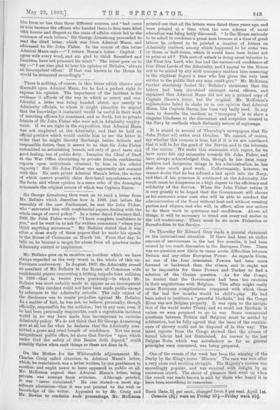There is nothing, of course, in this letter which throws
any discredit upon Admiral Mann, for ho had a perfect right to express his opinion. The importance of the incident is the evidence it affords of the way in which so secret and con- fidential a letter was being handed about, not merely to Admiralty officials, to whom it might plausibly be argued that the knowledge it contained would be useful in their work of selecting officers for command, and so forth, but to private friends of Sir John Fisher who were not in Admiralty employ- ment. If we are right in the supposition that Admiral Mann was not employed at the Admiralty, and that he held no official position which would entitle him to see the letter in order that he might thereby discharge better delicate and responsible duties, then it seems to us that Sir John Fisher committed an astonishing breach, not only of good taste and good feeling, but of public duty. Imagine the Chief of Staff at the War Office circulating to private friends confidential reports upon individuals obtained by him in his official capacity ! But Sir John Fisher was apparently not content with this. He next prints Admiral Mann's letter, the writer of which cannot possibly claim first-hand acquaintance with the facts, and whose opinion is a mere echo of the damaging comments the original source of which was Captain Bacon.






































 Previous page
Previous page